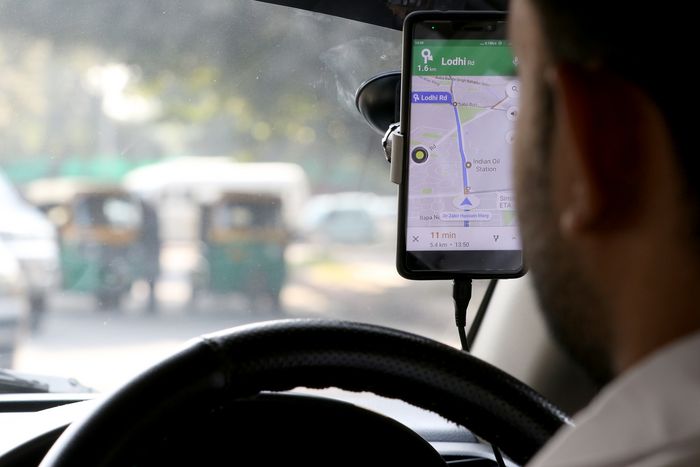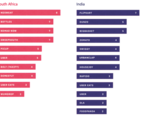Platforms like Yelp and Trip Advisor offer ratings that help tourists find locations and adventures for their journey. At the same time bad reviews can be a huge incentive for tourist providers to improve their services. So why shouldn’t this system be applied to improve working conditions? The Fairwork Foundation has incorporated the idea and is rating the fairness of digital labour platforms. The goal of the project is to define standards for decent working conditions in the platform economy and to measure the real working conditions against these standards.
The Fairwork Foundation is demanding better working conditions from platforms
The Fairness Foundation is an action research project based at the Oxford Internet Institute of the University of Oxford. To set global standards for fair work in the platform economy, the Foundation did an extensive literature review on job quality, held stakeholder meetings in India and South Africa and conducted stakeholder meetings at UNCTAD and the ILO in Geneva involving platform operators, policy makers, trade unions and academics. While the Foundation has already rated digital labour platforms like Uber and Deliveroo, its rating system could also be applied to tourism platforms to force them to provide fair pay, conditions, contracts, management and representation to their workers.
Local Start-ups do not automatically provide better working conditions
When it comes to the exploitation of workers, many instantly think of huge international corporations. However, small local Start-ups not always do better. Start-ups often follow the lead of international corporations because they signify success. Venture capitalists and other funders rarely investigate whether start-ups provide good working conditions to their workers, as they are usually more concerned with profitability and scalability. As long as metrics of success for businesses are defined in this way, it is difficult to expect start-ups to lead the way for fair work.
Grassroot movements against worker’s rights violations in the platform sector are growing
While collective organisation among informal workers, on-demand workers and digital platform workers’ is challenging compared with traditional employees, it is present and growing. Even without formal organisations, workers do a lot to support each other and mitigate some of the work-related risks that they face daily. For example, the Fairwork Foundation found out that in India and South Africa food delivery riders and rideshare drivers watch out for each other on the streets, against accidents, harassment and any other potential risks such as violence and theft. They maintain WhatsApp and Facebook groups to inform and help each other. They also notify each other when the traffic patrol comes in an area to tow bikes and issue fines. Sometimes, these networks are mobilised to organise strikes, flying pickets and other direct actions against the platforms. But platforms often punish workers who participate in such actions by cutting down incentives and lowering their earnings per ride. Civil society and consumers should therefore demand that platforms honour their workers’ ILO-enshrined right to collective action.
Customers can do their part
While a formal rating system may not be present yet across all touristic contexts, consumers have the chance to demand better working conditions in the field of tourism platforms:
- Put pressure on tourism platforms!
Only book hotels and services who can demonstrate that all workers earn at least minimum - or even better - the living wage. This should also apply to those workers who are subcontracted through intermediaries. This can be proven through a third-party living wage certification scheme such as that of the Living Wage Foundation, which is already working with touristic service providers like restaurants, security and cleaning services. - Stay alert!
Find out which company is hiding behind a platform and how it is organised. Avoid tourism platforms that outsource their operations to workers via cloudwork. They often sidestep labour laws. - Do your research!
Investigations into recent scandals can help to find out about worker rights’ violations. For example, a recent report on Indian hotel chain Oyo revealed that many hotels that Oyo had subcontracts with weren’t being paid as promised. Instead, additional and hidden fees lead to a disproportionately rise of the share Oyo obtained.
Five prinicples for decent work
The Fairwork Foundation uses five principles to measure standards of work at a given platform:
- Fair Pay
Workers, irrespective of their employment classification, should earn a decent income in their home jurisdiction after taking account of work-related costs.
- Fair Conditions
Platforms should have policies in place to protect workers from foundational risks arising from the processes of work, and should take proactive measures to protect and promote the health and safety of workers.
- Fair Contracts
Terms and conditions should be transparent, concise, and provided to workers in an accessible form. The party contracting with the worker must be subject to local law and must be identified in the contract. If workers are genuinely self-employed, terms of service are free of clauses which unreasonably exclude liability on the part of the platform.
- Fair Management
There should be a documented process through which workers can be heard, can appeal decisions affecting them, and be informed of the reasons behind those decisions. There must be a clear channel of communication to workers involving the ability to appeal management decisions or deactivation. The use of algorithms is transparent and results in equitable outcomes for workers. There should be an identifiable and documented policy that ensures equity in the way workers are managed on a platform (for example, in the hiring, disciplining, or firing of workers).
- Fair Representation
Platforms should provide a documented process through which worker voice can be expressed. Irrespective of their employment classification, workers should have the right to organise in collective bodies, and platforms should be prepared to cooperate and negotiate with them.
The 2019 ratings
Each platform can achieve a maximum of two points per principle or a total of 10 points. The illustration at the end of the page shows the latest rankings of platforms in South Africa on the left and India on the right.
Best ranked in South Africa is NOSWEAT, a platform that helps clients find freelancers or permanent staff. By paying more than minimum wage, reviewing job adds for complying with health and safety regulations, clear and accessible terms and conditions in their workers’ contracts, fostering participation and allowing association of their workers and informed consent for data collection, NOSWEAT has almost scored in every principle.
WumDrop, a delivery service in South Africa, is ranked last. Except of paying minimum wage and a clear communication process for workers to discuss decisions and raise issue with the platform, the platform wasn’t able to meet one of the 10 Fairwork Foundation standards.
In India, Flipkart, the nation's biggest online store takes the lead. Although leading the ranking, the platform still has some work to do to offer fair contracts to all of their workers. Also, the platform didn’t recognise a collective body so far, that can undertake collective representation and bargaining.
Foodpanda, Ola and Uber, however, share the last ranking with only two Fairwork Foundation standards met. They all pay their workers more than the local minimum wage but failed to offer fair conditions, fair contracts, fair management and fair representation.
Lea Thin is a Berlin-based geographer and journalist. In her work she focuses on issues around sustainability, gender, climate and development policy.




